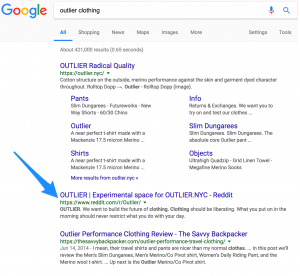Without a doubt, keywords are an integral element in any SEO strategy. The keywords you choose determine a huge part of your content strategy, and decide whether you’ll succeed in growing your site’s traffic.
That’s why you need to use a kick-ass keyword research tool.
The best tools will help you gain in-depth, actionable insights into what content your target audience is searching for, and which keywords your competitors are using to rank on top. Altogether, this will give you killer content ideas, and a basis for a strategy to drive traffic to your site.
The market for keyword research tools is huge, and it can be tricky to find one that works for you – especially if you’re new to SEO. But even as a seasoned SEO professional, it’s hard to keep track of all the tools out there, and their ever-evolving functionalities.
To help you get started – or discover new opportunities – here’s a list of the best keyword research tools available in 2020.
1 – Moz Keyword Explorer
When it comes to SEO, there are few players out there with more experience than Moz. Founded in 2004, Moz has constantly grown and evolved. It now offers a comprehensive SEO suite.
Moz’s Keyword Explorer is one of the top tools out there for exploring content ideas in your niche, and uncovering ranking potential.
Its strong suit is lateral keyword identification. Say the search term you enter is “fitness”. While most research tools will give you related keywords like “fitness videos” and “fitness tracker”, Keyword Explorer also comes up with queries such as “what are all the different types of exercise?” and “why is exercise so important to wellness”?
In general, the tool will give you information about the keywords’ search volume, ranking difficulty, opportunity, and potential. It also provides SERP analyses for every individual keyword. Moreover, it’ll show you top organic results for your search, together with info on each site’s page authority, domain authority, Facebook shares, and link counts.
All this results in a huge amount of keyword information, which you can export to CSV files. And get started mapping out content ideas.
While you have to register in order to use Moz’s Keyword Explorer, you get 10 free searches per month. For more, you will need a paid subscription, which ranges between $ 79 and $ 479 per month, depending on how many queries you want to launch, keywords you want to keep track of, and how many users are going to have access.
2 – Ubersuggest
Ubersuggest is a keyword research tool by Neil Patel, another digital marketing veteran.
Once you launch a query, Ubersuggest will give you info on monthly search volumes, average Cost Per Click (CPC) as well as competition on Pay-Per-Click (PPC) and SEO campaigns. You’ll get a pretty good idea of how difficult it will be to rank for each keyword.
Ubersuggest has a separate section for content ideas. Here, you can check out content related to your keyword that appears in top search results. It also lists estimated monthly visits, backlinks, and social media shares.
Finally, another nifty feature is that it can help you generate a variety of different keywords by juggling questions, comparisons and prepositions.
The best bit? Ubersuggest is free to use without keyword limitations. However, if you do sign up for a paid plan ($ 29 to $ 99, depending on tracked website and query volume), you’ll still get access to more in-depth data, and can create more search projects.
3 – Ahrefs Keyword Explorer
Ahrefs offers an extensive and well-known toolset for backlink and SEO analysis. It recently launched its new and improved Keyword Explorer, which gives you amazingly in-depth information on your search queries.
While you get standard metrics for each keyword, such as search volume, number of clicks and CPC, this tool also provides clear insights into the details of keyword difficulty.
Many tools out there tell you how hard it’s going to be to rank for a keyword by displaying an arbitrary score or a ranking from “easy” to “keep dreaming”. Cute, but not exactly transparent. Ahrefs pulls back the curtains: It’ll tell you exactly how many backlinks you need to rank on Google’s first page.
If you want to give Ahrefs a shot, there’s a 7-day trial for $ 7. After that, the site’s Lite plan starts at $ 82/mo. For larger projects, more users, or larger search volumes, the Standard ($ 149), Advanced ($ 332) and Agency ($ 832) plans are available.
4 – SEMrush
SEMrush has a different approach to keyword research. While other tools let you enter search terms and then return related keyword suggestions, SEMrush shows which ones competitors already rank highly for.
The key benefit of this is that SEMrush finds keywords that aren’t obviously related to the term you have in mind, but are in its semantic neighborhood. These may be easier to rank for than the more obvious choices.
Additional features of SEMrush include narrowing down your region of interest – which comes in handy especially if you’re outside the US – and its Keyword Magic tool. This tool pulls suggestions from the platform’s gigantic database. In any case, you will come out on the other side with a few solid content ideas.
One of SEMrush’s most serious downsides – especially for those just starting out – is its pricing. While there is a free trial, paid plans range from $ 83.28 to $ 333.28 per month (billed annually).
5 – AnswerThePublic
AnswerThePublic is a great place to start looking for keywords, especially if you’re new to the world of SEO.
This tool’s major advantage is its brilliant visualization of the results of your query. In a matter of minutes, you’ll get a good feel for the general structure of searches surrounding the keyword you’re interested in.
Basic results return graphics with questions, prepositions, and comparisons related to your query. You’ll also get an alphabetical list of related search terms. If you launch a query for “fitness”, you’ll get everything from “fitness app” to “fitness zip up jacket”.
Results can also be downloaded as CSV, giving you a solid basis for further research.
All of these features are available for free, though there’s a limit on the number of daily searches. If you sign up for Pro – $ 79 a month when billed annually – you’ll be able to compare data over time and set search alerts. You’ll also get access to educational eBooks and video courses.
6 – Jaaxy
Finally, Jaaxy’s Keyword tool is easy to use, gives you comprehensive info – and has the potential to return keywords that other tools won’t come up with.
How, you ask?
Jaaxy uses a combination of data straight from Google and its own proprietary database to come up with unique results for keyword research. Results are accurate, versatile, and rich. You get in-depth info on each generated keyword, ranging from search volume and potential traffic to competition when it comes to SEO.
One of the most useful features Jaaxy has to offer is its QSR tool – “Quoted Search Result”. This cryptic term stands for the number of other websites who are also currently trying to rank for the keyword you’re looking at. Obviously, the lower this number is, the better for you.
Like many others on this list, Jaaxy is a freemium tool. It offers 30 searches on its Free plan. If you want to go beyond that, you’ll have to sign up for Pro ($ 49/month) or Enterprise ($ 99/month).
Conclusion
When it comes to keyword research, the right tool can give you an invaluable edge over your competitors. Which particular tool is right for you depends on your niche, budget, focus, and experience in SEO. It will take some time of browsing, comparing and signing up for trials until you figure out which provider meets your needs. But with the massive and varied offer, you’re sure to find the right fit.
Once you do, you’ll be all set to draw up killer content ideas, and supercharge your SEO and digital marketing strategy.
Digital & Social Articles on Business 2 Community
(73)







